UNICEF HK and Playright urge for more inclusive playground for the all-round development of children with disabilities
2013-10-06
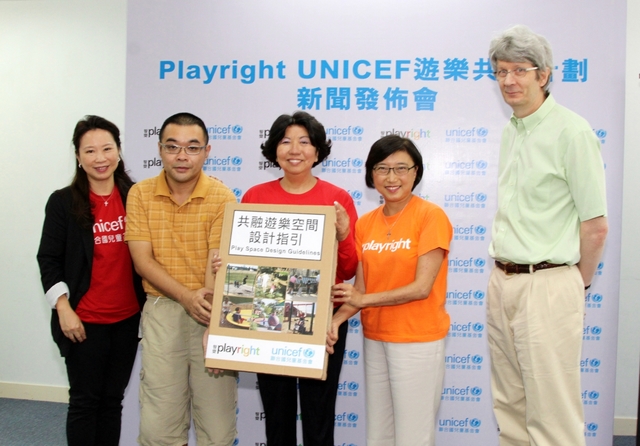
HONG KONG, 6 October 2013 — To realise ‘inclusive play’, Hong Kong Committee for UNICEF (UNICEF HK) funded Playright Children’s Play Association (Playright) through its Child Rights Advocacy Project and launched ‘Playright UNICEF Inclusive Play’ project (the Project) together since 2012. The Project assesses the condition of local inclusive playgrounds, the experience and needs of children with disabilities playing in playground. Research results showed over 60 per cent of children with disabilities played in playground less than once a week in the past three months; nearly half of parents considered suitable playground facilities were insufficient in the community. These reflected the concern over the poor standard of playground facilities in Hong Kong, which can deprive children’s right to play and development. UNICEF HK and Playright urge to enhance the standard of local inclusive play space for all-round development of children with disabilities.
UNICEF HK first launched ‘Unite for Children. Unite for Hong Kong’ Child Rights Advocacy Project in 2011 and invited charitable and non-profit making organisations with the same vision to cooperate in protecting the rights of local children. Since 2012, UNICEF HK had funded HK$500,000 to support Playright to implement ‘Playright UNICEF Inclusive Play’ project together, and advocate for ‘inclusive play’ through a series of publicity campaigns. No matter children live with disabilities or not, they should have equal access to quality play in suitable environments.
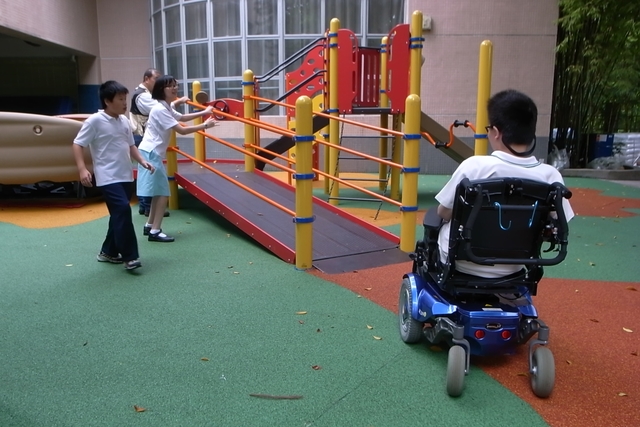 To assess the condition of local inclusive playgrounds and understand the play experience and need of children with disabilities, the Project conducted a detailed qualitative research via focus group discussion with parents of children with disabilities, while Social Sciences Research Centre of the University of Hong Kong was also invited to conduct a quantitative survey. The results showed that nearly 80 per cent of parents of children with disabilities agreed playground were important for the physical, sensory and social development of their children. However, 48 per cent of parents considered the number of playground in the community insufficient. Other 20 per cent of parents pointed out there is no playground located near where they live. All these reflected the insufficient playground facilities for children with disabilities.
To assess the condition of local inclusive playgrounds and understand the play experience and need of children with disabilities, the Project conducted a detailed qualitative research via focus group discussion with parents of children with disabilities, while Social Sciences Research Centre of the University of Hong Kong was also invited to conduct a quantitative survey. The results showed that nearly 80 per cent of parents of children with disabilities agreed playground were important for the physical, sensory and social development of their children. However, 48 per cent of parents considered the number of playground in the community insufficient. Other 20 per cent of parents pointed out there is no playground located near where they live. All these reflected the insufficient playground facilities for children with disabilities.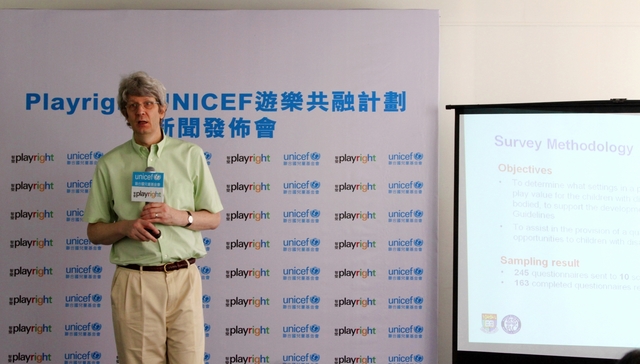 Besides, the survey also showed 61 per cent of parents ought their children to playgrounds less than once a week in the past three months. 25 per cent of parents interviewed even did not ing their children to playground in the past three months. For children with disabilities who had visited playground in the past three months, over 70 per cent played for less than an hour. Apparently, the right to play and health development of children with disabilities are not realised due to the insufficiency of playground facilities in the community.
Besides, the survey also showed 61 per cent of parents ought their children to playgrounds less than once a week in the past three months. 25 per cent of parents interviewed even did not ing their children to playground in the past three months. For children with disabilities who had visited playground in the past three months, over 70 per cent played for less than an hour. Apparently, the right to play and health development of children with disabilities are not realised due to the insufficiency of playground facilities in the community.In the qualitative research, parents reverted same concern over the insufficient playground facilities. They commented the playgrounds cannot meet the needs of children at different ages, especially the needs of children with disabilities. Some even criticised local playgrounds are not attractive. For example, there is only one kind of slides or swings, and there is no grassland, sand and water or facilities to enrich the sensory and social experience of children, which is essential for children with disabilities’ all-round development.
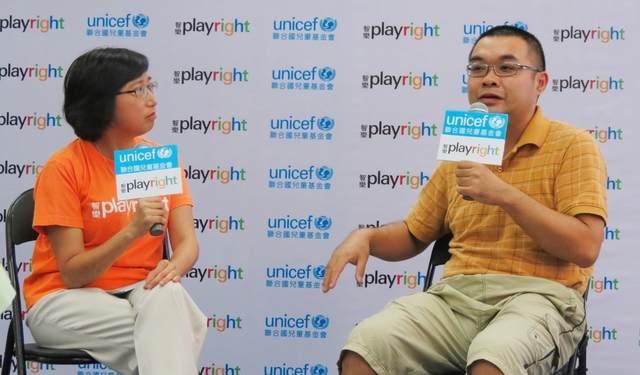 Mr Aaron Tong Cho-wing, a father of a 8-year-old boy with autism, Tung Tung, made a special appearance in the press conference to share his experience. He believes his son needs play, just like any other child. However, he cannot find any merry-go-round for his son to play which can help develop his son’s sensory system. The number of swings are also not enough that Tung Tung always has to queue up for long. Mr Tong is sad to see the play facilities available cannot meet Tung Tung's needs at his golden age of development. He said, "I hope we can reclaim a happy childhood for every child by providing an inclusive playground as soon as possible, so that the next generation can have a chance to interact with each other at a early age, and get to know the true meaning of inclusion."
Mr Aaron Tong Cho-wing, a father of a 8-year-old boy with autism, Tung Tung, made a special appearance in the press conference to share his experience. He believes his son needs play, just like any other child. However, he cannot find any merry-go-round for his son to play which can help develop his son’s sensory system. The number of swings are also not enough that Tung Tung always has to queue up for long. Mr Tong is sad to see the play facilities available cannot meet Tung Tung's needs at his golden age of development. He said, "I hope we can reclaim a happy childhood for every child by providing an inclusive playground as soon as possible, so that the next generation can have a chance to interact with each other at a early age, and get to know the true meaning of inclusion."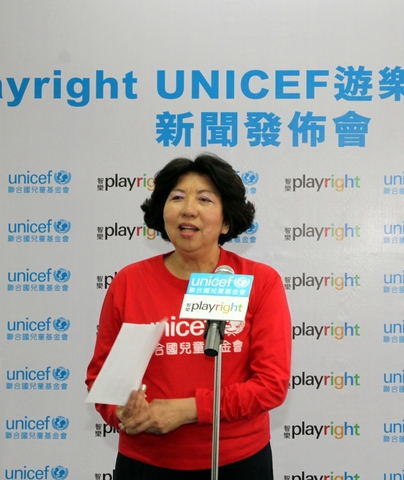 Ms Leonie Ki, Chairman of Advocacy and Public Relations Committee of UNICEF HK, stressed all children, including children with disabilities, should be able to enjoy their right to play as stated in the United Nations Convention on the Rights of the Child. “Every child, with or without disabilities, all needs play. Play is essential to the physical, mental, emotional and social development of children.” She hoped the Project could mobilise the community to protect the right to play of children with disabilities, by investing more resources, and put more efforts on the design of playgrounds.
Ms Leonie Ki, Chairman of Advocacy and Public Relations Committee of UNICEF HK, stressed all children, including children with disabilities, should be able to enjoy their right to play as stated in the United Nations Convention on the Rights of the Child. “Every child, with or without disabilities, all needs play. Play is essential to the physical, mental, emotional and social development of children.” She hoped the Project could mobilise the community to protect the right to play of children with disabilities, by investing more resources, and put more efforts on the design of playgrounds.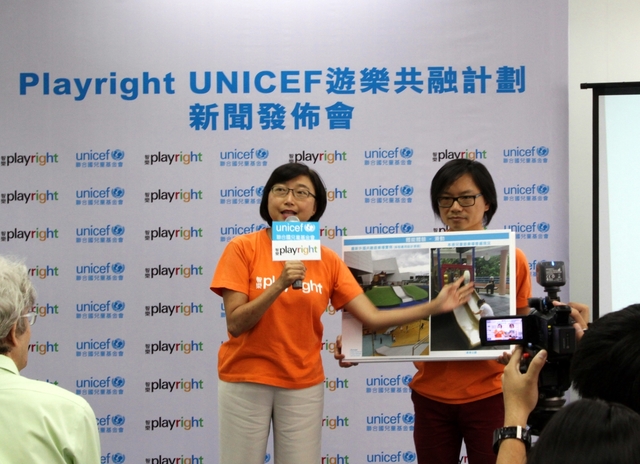 Ms Kathy Wong, Executive Director of Playright agreed playground is an indispensible element in children’s lives. To step forward, play-related industry should all know how to build an inclusive playground for children with disabilities. “We will base on the research findings and the latest international guidelines to publish the Inclusive Play Space Design Guidelines. This Guidelines will integrate the advice of global experts as well as the opinions of local industry. We are sure these first-ever internationally recognised, locally applicable guidelines in Hong Kong will create a new page in building local playground facilities.”
Ms Kathy Wong, Executive Director of Playright agreed playground is an indispensible element in children’s lives. To step forward, play-related industry should all know how to build an inclusive playground for children with disabilities. “We will base on the research findings and the latest international guidelines to publish the Inclusive Play Space Design Guidelines. This Guidelines will integrate the advice of global experts as well as the opinions of local industry. We are sure these first-ever internationally recognised, locally applicable guidelines in Hong Kong will create a new page in building local playground facilities.”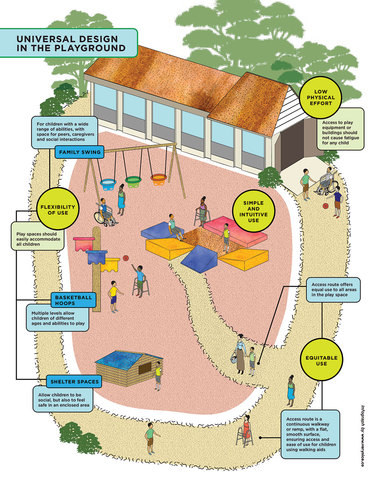 The concept of ‘Universal Design’, which is widely adopted in United States, Canada and India, will also be introduced to Hong Kong. Through the execution of Inclusive Play Space Design Guidelines, it is expected to see more true ‘inclusive play space’ in Hong Kong. The ‘inclusive play space’ drew upon the principle of ‘Universal Design’, which prompts designers of facilities taking the wide range of children’s physical and psychological abilities, children at different ages and of different body types into account. The inclusive playground will provide children with social opportunities in a safe way. For example, the basketball hoop should be equipped with different levels so as to meet the needs of different children. Different type of swings should also be available for accommodating wheelchairs and children accompanied by parents. The Guidelines is expected to be released early next year.
The concept of ‘Universal Design’, which is widely adopted in United States, Canada and India, will also be introduced to Hong Kong. Through the execution of Inclusive Play Space Design Guidelines, it is expected to see more true ‘inclusive play space’ in Hong Kong. The ‘inclusive play space’ drew upon the principle of ‘Universal Design’, which prompts designers of facilities taking the wide range of children’s physical and psychological abilities, children at different ages and of different body types into account. The inclusive playground will provide children with social opportunities in a safe way. For example, the basketball hoop should be equipped with different levels so as to meet the needs of different children. Different type of swings should also be available for accommodating wheelchairs and children accompanied by parents. The Guidelines is expected to be released early next year.Ms Leonie Ki added, “‘Inclusive play’ benefits the physical and psychological development of a child. Through the play and interaction with others, children with disabilities can better explore the world and understand their capacity, further develop their potential and contribute to the development of a society when they grow up. Even children without disabilities can also learn how to cope with others, and ultimately we can build a more inclusive society.”
‘Unite for Children. Unite for Hong Kong’ Child Rights Advocacy Project aims to promote and realise the right of local children, striving to advocate the right of children to the community. We hope to cooperate with all social sectors to unite for children, making Hong Kong to be an ever child friendly city.
- END -









